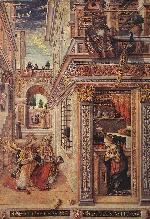
This is the Renaissance,
everything is for sale. The poor man
is greedy (that's why he's poor –
does Ficino tell us this, or Bruno?),
ill-dressed, his hair a mess.
Yet this transaction is directly underneath
the glory of God.
These characters (dubious seller,
too-comfortable doubtful buyer)
are closer to the Divine Light
than Mary is. What does this mean?
